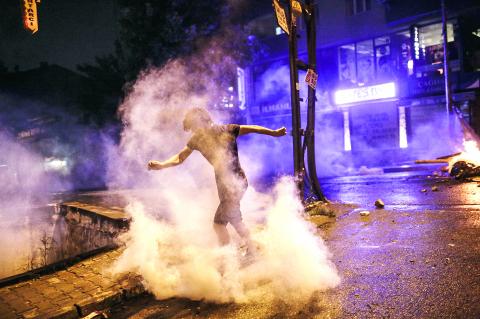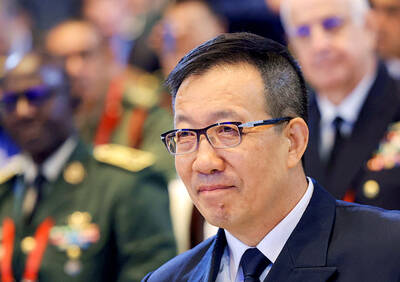The Turkish military yesterday carried out a second wave of strikes against targets controlled by Islamic State (IS) militants in Syria and embarked on a new air campaign to bombard camps of Kurdish militants in northern Iraq.
The two-pronged operation against IS and militants from the Kurdistan Workers’ Party (PKK) — two groups who are themselves bitterly opposed — came after a week of deadly violence in Turkey the authorities blamed on the organizations.
The Turkish F-16 jets all returned safely to their base in the southeastern city of Diyarbakir early yesterday after the latest raids, the Anatolia news agency reported.

Photo: AFP
The raids against IS, which had begun before dawn on Friday, marked a major shift in policy towards the group by key NATO member Turkey, which has faced severe criticism from its Western allies for not doing enough to combat the militants.
However, on this occasion planes also bombed positions of the PKK in neighboring Iraq, where the outlawed group’s military forces are based.
“Strikes were carried out on targets of the Daesh [IS] terror group in Syria and the PKK terror group in northern Iraq,” the office of Turkish Prime Minister Ahmet Davutoglu said in a statement.
It said shelters and warehouses containing PKK weapons were hit in the northern Iraq operation, listing seven locations where the strikes had been carried out including Mount Kandil, where the PKK’s military leadership is based.
In addition to the air raids, Turkish ground forces also carried out artillery strikes against IS in Syria and the PKK in northern Iraq, the statement said.
“At around 11pm tonight, Turkish warplanes started bombing our positions near the border, accompanied by heavy artillery shelling,” PKK spokesman in Iraq Bakhtiar Dogan said.
NATO and the UN have been kept informed of the operations, the Turkish statement said.
The Turkish air strikes against the PKK targets in northern Iraq raised questions about the future of the delicate peace process between Turkey and Kurdish rebels, who until now have largely observed a ceasefire since 2013.
The PKK has for decades waged a deadly insurgency in the southeast of Turkey for self-rule that has claimed tens of thousands of lives.
The violence in Turkey erupted after the killing of 32 people in a suicide bombing on Monday in the Turkish town of Suruc on the Syrian border carried out by a 20-year- old Turkish man linked to IS.
That attack sparked an upsurge in violence in Turkey’s Kurdish-dominated southeast, where many accuse Turkish authorities of collaborating with IS. The PKK then outraged the government by claiming the shooting dead of two Turkish police at home while they slept.
Turkish security forces yesterday launched new raids to arrest suspected IS and PKK members in Istanbul and other cities, adding to hundreds of detentions already made the day earlier.
A total of 320 people have so far been arrested in 22 provinces across Turkey, Davutoglu’s office said.
As well as IS and the PKK, the arrest operations also targeted suspected members of the PKK’s youth wing, the Patriotic Revolutionary Youth Movement, and the Marxist Revolutionary People’s Liberation Party Front.
With tensions running high across the country, Turkish police used tear gas and rubber bullets to disperse a protest in the Istanbul district of Kadikoy by hundreds of people to denounce IS violence.
In the anti-establishment district of Gazi, protesters threw Molotov cocktails and engaged in pitched battles with police, an AFP photographer said.
Protesters in Gazi also defiantly carried the coffin of Gunay Ozarslan, a female activist killed in clashes with police on Friday during a raid on leftist militants.
Thousands are expected to respond to a call from Turkey’s main pro-Kurdish party and turn out for a “march for peace” today in Istanbul which is set to be monitored by a heavy security presence.
Turkey has been accused of colluding with IS extremists in the hope they might further Ankara’s aim of toppling Syrian President Bashar al-Assad.
Ankara has always vehemently denied the claims but the NATO member has dodged playing a full role in the US-led coalition assisting Kurds fighting IS militants.
Now, however, Ankara has finally given the green light to US forces for the use of its Incirlik base for air strikes against IS in Syria and Iraq, according to US and Turkish officials.
“A decision has been taken for Turkey’s own security,” Davutoglu added, declining to give details on the agreement.
The Dogan news agency said three war planes had taken off from Incirlik to strike targets inside Syria as part of the raids overnight on Friday. However, their nationality was not made clear.

DEADLOCK: Putin has vowed to continue fighting unless Ukraine cedes more land, while talks have been paused with no immediate results expected, the Kremlin said Russia on Friday said that peace talks with Kyiv were on “pause” as Ukrainian President Volodymyr Zelenskiy warned that Russian President Vladimir Putin still wanted to capture the whole of Ukraine. Meanwhile, US President Donald Trump said that he was running out of patience with Putin, and the NATO alliance said it would bolster its eastern front after Russian drones were shot down in Polish airspace this week. The latest blow to faltering diplomacy came as Russia’s army staged major military drills with its key ally Belarus. Despite Trump forcing the warring sides to hold direct talks and hosting Putin in Alaska, there

North Korea has executed people for watching or distributing foreign television shows, including popular South Korean dramas, as part of an intensifying crackdown on personal freedoms, a UN human rights report said on Friday. Surveillance has grown more pervasive since 2014 with the help of new technologies, while punishments have become harsher — including the introduction of the death penalty for offences such as sharing foreign TV dramas, the report said. The curbs make North Korea the most restrictive country in the world, said the 14-page UN report, which was based on interviews with more than 300 witnesses and victims who had

COMFORT WOMEN CLASH: Japan has strongly rejected South Korean court rulings ordering the government to provide reparations to Korean victims of sexual slavery The Japanese government yesterday defended its stance on wartime sexual slavery and described South Korean court rulings ordering Japanese compensation as violations of international law, after UN investigators criticized Tokyo for failing to ensure truth-finding and reparations for the victims. In its own response to UN human rights rapporteurs, South Korea called on Japan to “squarely face up to our painful history” and cited how Tokyo’s refusal to comply with court orders have denied the victims payment. The statements underscored how the two Asian US allies still hold key differences on the issue, even as they pause their on-and-off disputes over historical

BEIJING FORUM: ‘So-called freedom of navigation advocated by certain countries outside the region challenges the norms of international relations,’ the minister said Chinese Minister of National Defense Dong Jun (董軍) yesterday denounced “hegemonic logic and acts of bullying” during remarks at a Beijing forum that were full of thinly veiled references to the US. Organizers said that about 1,800 representatives from 100 countries, including political, military and academic leaders, were in Beijing for the Xiangshan Forum. The three-day event comes as China presents itself as a mediator of fraught global issues including the wars in Ukraine and Gaza. Addressing attendees at the opening ceremony, Dong warned of “new threats and challenges” now facing world peace. “While the themes of the times — peace and development —